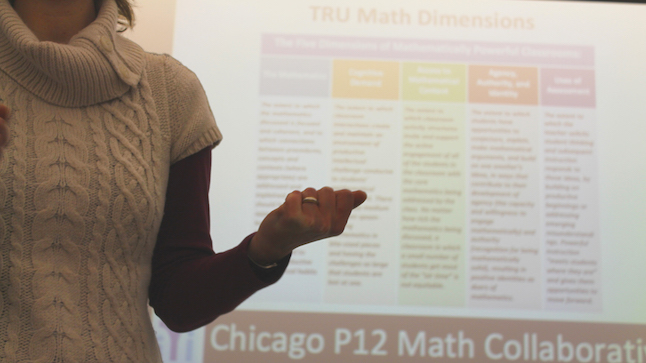Series: About Early Math
Why Do the Math Wars Rage On?

Are the “Math Wars” back like a bad movie sequel? Why does the debate continue, sometimes vehemently, even when most people agree that quality math education must focus on both skills and conceptual understanding?
Perhaps it is the adoption of new standards, the Common Core State Standards for Mathematics (CCSS-M). They have reinvigorated the debate. I was taken aback by a recent opinion piece in The New York Times about the role of algorithms. To read it, it sounds like the Math Wars are far from settled, generating over 800 comments over the last few weeks. Why this persistent ambivalence about math education? Why such emotional, polarized views?
To give some background, the Math Wars (Part I) were triggered in the 1990s with the release of the so-called “reform” math curricula. The argument was over the proper balance of skills and concepts to be taught to U.S. school children (using the loaded language of the day—drill and kill versus fuzzy math).
In 2006, partially in response to this highly-charged debate, President Bush created the National Mathematics Advisory Panel to examine and summarize the scientific research regarding the teaching and learning of mathematics. The panel’s 2008 report called for an end to the Math Wars, concluding that research showed:
conceptual understanding, computational and procedural fluency, and problem solving skills are equally important and mutually reinforce each other. Debates regarding the relative importance of each of these components of mathematics are misguided.
This report was one document that informed the development of the CCSS-M, which have been adopted by a large majority of states nationwide. The CCSS-M states virtually the same thing: “Conceptual understanding and procedural skill are equally important.” Sounds like a truce, right? A win/win situation? Wrong. The backlash has already begun.
In my opinion, the ambivalence about math education is a reflection of the anxiety we feel as a society in transition to a new economy. What skill set do the workers of tomorrow need? If we believe that science, technology, engineering, and mathematics hold the future promise for our nation, how do we prepare students for success in these fields? Does teaching algorithms lead us to greater achievement?
An algorithm is a well-defined, step-by-step procedure guaranteed to achieve a certain objective. A good algorithm is efficient, unambiguous, and reliable. For example, an algorithm for addition will produce the correct sum no matter what the addends are. It sounds like algorithms are the silver bullet of math education, right? Many people would have you think that. However, in mathematics, students need to not only know algorithms, but also how and when to use them appropriately.
One small mistake in an algorithm can produce a colossal error, which a child will not catch unless she knows how to make sense of a problem and estimate a reasonable solution. Quickly it becomes obvious that algorithms or formulas alone are inadequate. Only with conceptual understanding can students compute flexibly, accurately, and efficiently.
In a changing world, don’t we all wish there were more procedures with guaranteed outcomes? Algorithms have the allure of a sure thing. But we must advance the discussion beyond the false choice of skills or concepts. Our school children deserve both. The mathematician (or architect or doctor or computer programmer) of the future will need to adapt known algorithms to fit new situations.
What do you think? Should the Math Wars be settled? Are there innovative ways to address this debate with people who continually choose to fight this war?